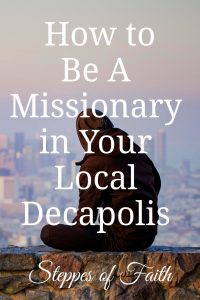
“Go home to your friends and tell them what great things the Lord has done for you.” Mark 5:19
My Bible study group is going back through the book of Mark. Isn’t it amazing the little things you still learn after you’ve read something for the fifth time, especially the Bible?
Take Mark 5, for example. It begins with Jesus visiting a foreign land called Decapolis and healing a man who lived among the tombs. Do you remember who I mean? A demon named Legion had taken over this man, and for years he ran around naked in a cemetery and the nearby hills. Jesus healed the man and cast the demons into a herd of pigs that ran off a cliff to their death.
Spooky story. Try telling that one around a campfire late at night.
What’s interesting about this event goes beyond the man’s miraculous deliverance from demonic possession. It goes beyond how the pig farmers saw what happened and told the other villagers, who were duly freaked out. And, it goes beyond Jesus’ compassion and power in the midst of such evil.
What’s interesting is where the event happened—Decapolis. Let’s just say it wasn’t a very nice place. It was nowhere you would ever want to be. That is unless you’re God. Because sometimes you have to go where you don’t want to go.
After the Storm
The story in Mark 5 occurs right after Jesus and the disciples get caught in a terrible thunderstorm while crossing to the east coast of the Sea of Galilee. Let’s do a quick recap.
Jesus is exhausted from a full day of teaching, so He’s asleep in the back of the boat. The boat is taking on water and the disciples are terrified they are about to drown. They wake Jesus up, and right away He calls out, “Peace, be still!” Immediately, the winds and waves stop moving and they continue their journey.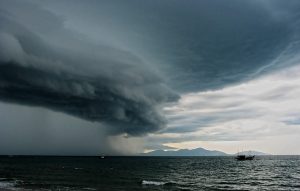
Now, picture the scene:
It was a seven-mile sailing trip that probably took several hours (especially since Jesus calmed the wind)…
…they were traveling at night…
…they were already nervous because they were crossing a huge lake where the local myth was you were likely to die if you crossed through the middle of it…
…they had just survived a potentially deadly thunderstorm…
…they had just witnessed Jesus performing an extraordinary miracle that left them (still) wondering, “Who can this be that even the wind and the sea obey Him,” and…
…they still needed to deal with the people on the east coast.
What’s so wrong about the people on the east coast, you might ask?
This area of Israel was called Decapolis, which means “ten cities,” and it was where the evil, sinful, unclean, idolatrous, rebel rousing, sexual freedom seeking, party-all-night pagans lived. It was no place for a nice Jewish man. The disciples knew they would be ceremonially unclean if they went there, but Jesus wanted to go so they went anyway.
Why did Jesus want to go there? Because that’s where He was needed, even if the disciples didn’t know it. Jesus was about the change a man’s life who would then change the world.
A Little Decapolis History
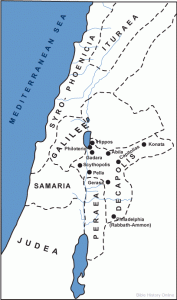
Map of Decapolis
From the western shore of the Sea of Galilee, you can see rather large hills on the east side where an area of the Decapolis once stood.
The Decapolis was a group of ten semi-autonomous cities established by Greece under Alexander the Great as places for its soldiers to settle after their military service. Over time, these soldiers created as many as eighteen cities (Ceasar Augustus gave two of them to Herod the Great), but only ten are counted as part of the Decapolis.
Two of the cities still exist today—Damascus in Syria and Philadelphia, which is now Amman, Jordan, and you can find the ruins of another two—Hippos and Scythopolis. The others have long been destroyed.
After Alexander’s death, four generals carved the area up into four kingdoms. Two of them bordered Judea—Seleucus to the north (modern-day Syria) and Ptolemy to the south (modern-day Egypt). The Romans later conquered all of it.
Greece wanted Decapolis to be the most modern area in the world, one that everyone would admire and envy. The cities had their own court system, currency, theaters, educational institutions, army, and multi-god temples, marble floors, mosaic walls, and live athletic games. Most incredible of all, they had running water (yep, the beginning of indoor plumbing).
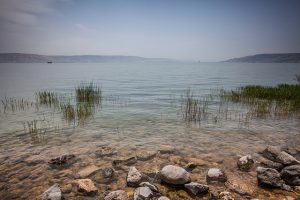
The Sea of Galilee with Decapolis in the background
Like Oil and Water
The problem was that the Jewish people did not like the Decapolis people. They were like oil and water.
Many Jews believed the pagans of Decapolis were direct descendants of the Canaanites who were driven out of the Promised Land hundreds of years before by Joshua and the Israelites (Joshua 3:10), and their behavior appeared to reflect their ongoing pagan practices.
The Jewish people—the Pharisees in particular—were disgusted at the Greek’s worship of Baal, their acceptance of eating pork, the ceremonial sacrifice of children, loose, immoral living, and their intrusion into the Jewish way of life. And, the Greeks thought the Jewish were a bunch of country bumpkins with backward, old-fashioned thinking and far too much fanaticism about Yahweh (God).
When the Romans conquered the Greeks, the Greeks were only too happy to join the Romans and get away from the Jewish culture. They could finally enjoy Rome’s protection and elegance, and Rome could use the areas’ lucrative trade routes (and the birth of modern highways) that linked Damascus with Arabia.
It was this pork-eating, Baal worshipping, sexual loosey-goosey, greedy group of people that Jesus chose to visit the night He calmed the storm.
By now, you should be getting a better picture of what the disciples might have been thinking and feeling when He told them He wanted to go to the other side of the water (Mark 4:35). But, Jesus had a mission to fulfill.
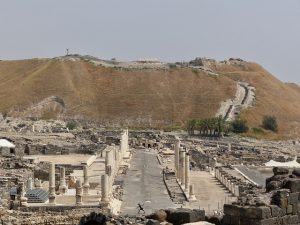
The ruins of Scythopolis
The First Missionary
The Greeks are sick and tired of being preached to by the Jews, but then Rabbi Jesus shows up. He heals the man who was living in the cemetery by casting out his demons and sending them into a herd of pigs.
The pig herders run and tell everyone what they saw, which made the townspeople come running to see for themselves. When they get there, they see the famous crazy man in his right mind, a herd of dead pigs at the bottom of the cliff, and Jesus. Confusion and fear run amok, so they beg Jesus to leave.
Jesus turns to leave, but the now-sane man begs the Lord to allow him to join his disciples. But, Jesus says no. Instead, He says,
“Go home to your friends and tell them what great things the Lord has done for you, and how He has had compassion on you.” Mark 5:19
The man didn’t argue with Jesus. He simply left the cemetery “and began to proclaim in Decapolis all that Jesus had done for him, and all marveled (Mark 5:20).”
ALL of them marveled.
And just like that, the pagan world had its first missionary.
We are All Missionaries

Non-believers are all around us, and they are starving for truth and meaning in their lives whether they want to admit it or not.
Just like Jesus and the man He healed, we can’t be afraid of people who don’t believe or agree with our faith. And, we can’t wait for them to come to us seeking understanding. Instead, as disciples of Christ who have been commanded to spread the Gospel throughout the nations (Matthew 28:19), we need to take the word of God to them.
I’m not saying we need to be door-to-door or street corner evangelists or even travel to a pagan town across a lake. I’m suggesting we need to remain open to sharing our faith with whomever we meet no matter where we are.
From grocery stores to baseball fields to schools, we can find people who are so caught up in the Decapolis lifestyle that they miss Jesus when He comes by. But, we can change that.
Sharing Our Faith
Sharing our faith doesn’t have to be complicated. It really can be so simple if you have just a speck of courage.
- A subtle “praise the Lord” or “God is good” when something good happens to someone is a great way to start.
- If you’re comfortable, you can try sharing your belief that it’s all God when something good happens to you, or you can mention tidbits of Scripture when a friend is going through a trial.
- For the more advanced, you might share your testimony (how you met God). And of course, offers of prayer are always great no matter what level you’re on.
- The man Jesus healed…he just told people what happened to him. That’s plenty enough to change someone’s life.
Jesus approached the non-believers of Decapolis, then He planted the first missionary there. Where do you live? What can you do? There’s no need to be afraid. With God, nothing is impossible.
Believe that you too can be a missionary in your own local Decapolis.
Your Turn
What other small ways can you show others who Jesus is and what He’s done for you? How can we feel confident about speaking out? I’d love to hear your ideas. Please share them in the comments below, or you can message me here. Let’s encourage each other to be bold for Jesus our Savior.
Further Reading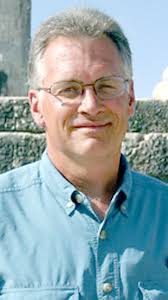
Pastor Ray Van der Laan is an amazing Bible scholar. His everyday style makes it easy to understand Bible history. You can read his article about Decapolis and Jesus’ work there as well as other very interesting articles and videos over at his website, www.thattheworldmayknow.com.
